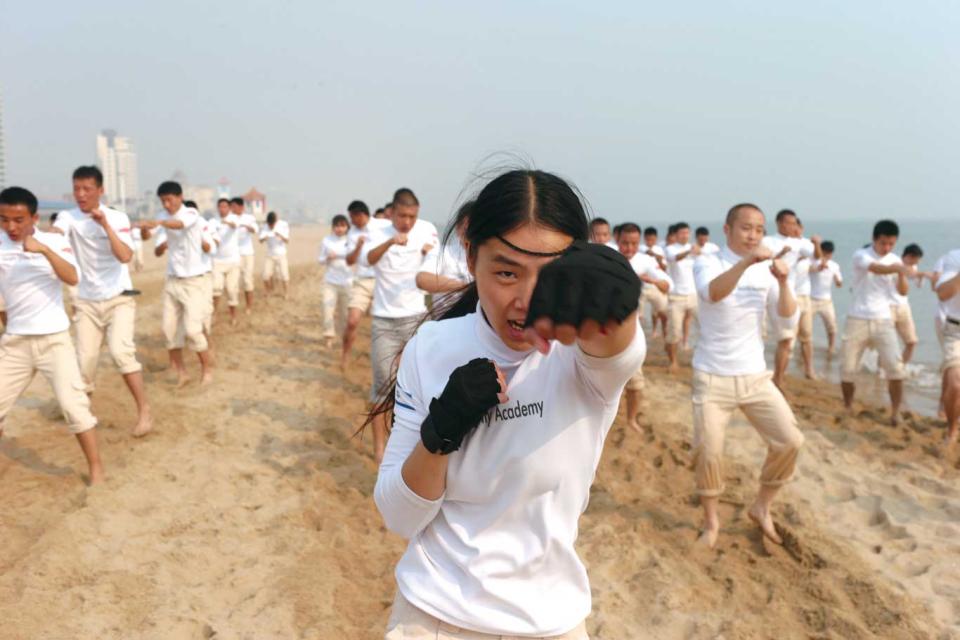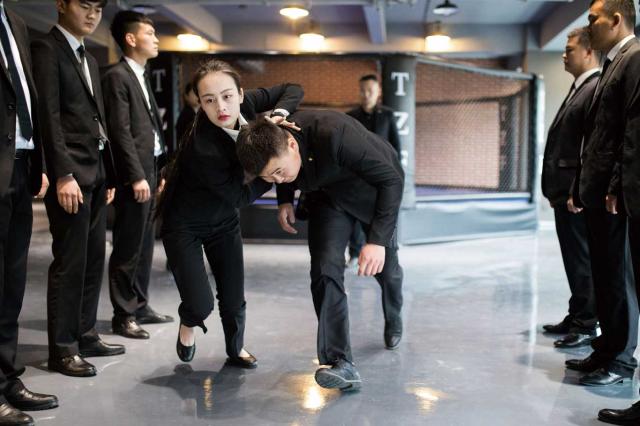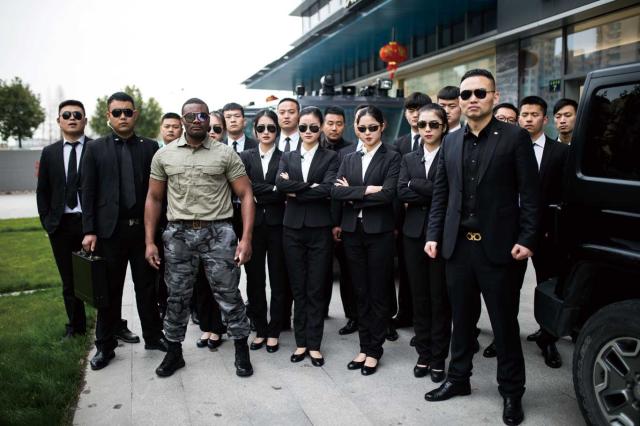Public events do not normally have “snipers” hidden among the watching crowds, but at the World Bodyguard Championship 2017, held in Chisinau, capital of Moldova, in September 2017, there were simulated attacks and kidnappings, and displays of precision driving that would not look out of place in a Fast and the Furious movie. That year, for the first time, a Chinese team took part.
First held in 1998, the annual competition attracts participants from more than 30 countries, who vie to demonstrate their prowess in safeguarding a target in the face of any number of simulated dangerous situations. The Chinese team was led by Li Xu, one of China’s top bodyguards. His Nine Lives team thrilled the audience, including a solitary Chinese man, by coming top in several exercises. The man in the audience shouted excitedly when he saw the Chinese flag.
“He was even more excited than us. He told us that he’d never imagined he’d see a Chinese team at a bodyguard competition,” Li told NewsChina.
But, he said, his team cannot represent the nation. “We’re just a private organization,” he emphasized, “but we are as good as any other foreign team.” In the end, though, the home team prevailed, with the State Protection and Guard Service of Moldova winning out.
Although China issued the Regulation on the Security Guard Service in 2010, the profession is still somewhat of a mystery to most people. Many think that bodyguards are just “muscle” – mostly thanks to their strong connections to martial arts.
“I want to change the old image of private bodyguards through the competition... I want to tell people that the job actually requires a wise head more than a strong body,” Li said.
While the profession did not get legal recognition until 2010, there have been bodyguards for a long time in China – but most people only knew of them through their depiction in martial arts movies, TV shows and novels. This is what led to the stereotyped view of a bodyguard as a kung fu master – like Bruce Lee or Jackie Chan – who can single-handedly take on and defeat 10 adversaries in a fight.
Most Chinese bodyguards do have a martial arts background. Li was born into a family of martial arts practitioners, and he started learning boxing at the age of five. In his teens, he won a silver medal at a martial arts competition in Beijing, and he started working as a bodyguard in 1990. Li said his early engagement in the industry was largely due to Hong Kong gangster movies, but he never agreed with the notion that bodyguards are just “muscle for hire.”
His thinking was reinforced in 2005, when he went to train at the James J Rowley Training Center, near Washington, DC – which is home to the US Secret Service. Li, the first Chinese student at the center, participated in more than 40 courses, including knowledge of firearms, operation of portable equipment, risk assessment and route analysis. He concluded that “a private bodyguard’s wisdom lies in assessing potential risks and preventing them in advance, rather than using violence if there is a threat to the person you are protecting.” After he returned, he set up his own company in 2006, the Beijing-based Nine Lives Protection Team. The firm’s logo is a fierce big cat.
Shi Xingfeng, founder of the Beijing-based Bojing Security Agency, went through a similar learning curve. Having learned martial arts at Shaolin Temple in Henan Province, globally known as a center for martial arts, Shi started work at a private security company in Beijing in 2003, only to find that the boss regarded him as little more than a human shield. “People thought that bodyguards should stand in front of the boss to block any risk, and use violence to solve it,” he said. Offended by the misunderstanding, Shi quit the next day.
In 2008 during a performance tour in Spain, he met with a foreign private security firm and accepted a job offer, where he experienced what is was like to be a “Western-style” private bodyguard. “It’s a decent job and the role a bodyguard plays is to assess and avoid risk,” he told NewsChina. In 2010, Shi returned to China and founded his own company based on these working practices.
Most security professionals agree that their job requires much more brain power than physicality. Wang Haichun, CEO of Hangzhou-based security firm Tianzun Special Guard, did not emphasize his martial arts background, instead talking of his qualification in drift driving and his ability to play golf. He is also planning to learn to fly. “We only provide high-end bodyguard services for celebrities, business-people and politicians,” he said.
The pinnacle of being a professional personal security provider lies in high-end services, and this is where the real money is. A manager at Qufu Xuanyuan Special Guard Institute, a private security company based in Shandong Province, told the China Economic Herald, a Beijing-based paper, that its staff had only worked as low-end security guards in residential communities, and the firm was operating at a loss, until they put their staff through professional training and started working for celebrities.
According to Wang Haichun, a big part of his company’s work is protecting superstars, especially when they go to a city for a publicity event. “Crowd control is very technical – if the fans are too far from the star, they think the star is arrogant, but if they get too close, it might be harmful to the star,” he said. “And in many cases, our duties are more complicated, we have to be invisible. Wearing a black suit, sunglasses and an earpiece, those bodyguards hide in the dark like shadows and cooperate with visible security staff to check for any potential risks.”
Shi said that his company had provided nine “shadows” to protect Arnold Schwarzenegger when he visited Beijing in September 2017. They checked out every place on the actor-turned-politician’s itinerary beforehand – and even some that were not on the schedule.
Li Xu defines his company at an even higher level – They only protect captains of industry and political big shots. Since most of their clients need to travel incognito, they provide “three-dimensional” protection, including “behind-the-tree” guards in charge of remote surveillance, “under-the-window” guards to keep the perimeter safe, “on-the-stair” and personal bodyguards for in-house safety.
“These [high-end] security personnel deserve a higher salary and a higher social position,” Li said. According to Li and Wang, a senior bodyguard can earn around 0.25-1 million yuan (US$38,462-153,846) annually, depending on the nature and duration of their services.
That’s one of the reasons why their companies rigorously screen candidates and provide comprehensive training – Wang is even planning to get psychological assessments for his employees.
“We have to ensure the staff we provide is 100 percent reliable,” Wang said. “Generally speaking, we prefer retired soldiers, since the military will have looked into their backgrounds before and they are highly disciplined... We also hire those who have a martial arts background or who graduated from a sports college, but we won’t accept anyone with a criminal background or somebody who was involved in gangland,” Wang said.
According to Xin Shicai, president of Qufu Xuanyuan Special Guard Institute, even those with a military background should receive strict training, since private security guards are in a completely different environment and require a different set of emergency capabilities.
But as securely as they guard their clients, they guard the secrecy of their business even more. As competition in the industry heats up, few will reveal details of their jobs and training methods – they do not even tell their families. This means it is hard for media or industrial analysts to get specific information on how big the market is and how many people are engaged in it.
Despite the secrecy, it is obvious there is growing demand for their services, but firms are also struggling to fill positions. A Chongqing-based private security company told local paper Chongqing Business in early 2018 that the current drop-out rate for their recruits is 85 out of 100, and there is a severe shortage of qualified candidates that far outstrips demand.
Xin Shicai told the China Economic Herald that their business has expanded to prisons, government departments and large enterprises. Another local security company in Shandong also told the paper that they have set up more than 30 branches in cities like Beijing and Shanghai. In Qingdao, also in Shandong, a local security firm even launched an app called Jin Yi Wei, which translates to “the imperial bodyguards in the Ming Dynasty.” The app has 47 security firms to choose from, with over 50,000 professional security staff. The company hopes its leap into the digital economy will be as successful as ride-hailing apps.
Thanks to China’s embrace of globalization and the Belt and Road Initiative, Chinese private security services have become a crossborder business. Li’s employees often escort their high-ranking customers abroad, and Wang said they are in talks with a construction enterprise to provide overseas security services. They have also contracted with a tourism company to offer security on tours to the Antarctic.
Private industry analysts the Qianzhan Industrial Institute published a report in 2015 on the market prospects and investment in Chinese security services, indicating that turnover in 2015 was 54.6 billion yuan (US$8.4b), a 15 percent annual compound growth. Supposing that Chinese private security services grow by 10 percent every year, the market will expand to around 100 billion yuan (US$15.4b) by 2021. In 2016, Phoenix Intellectual Think Tank under ifeng.com and the Tsinghua Center for US-China Relations released a report on the security management of overseas enterprises, which said that the overseas market for Chinese security services was US$10.3 billion in 2015.
Many insiders believe that as China did not open the private security market until 2010, the industry is still in its infancy, and there could be problems on the horizon. Xin Shicai, for example, said that the market has not yet fully opened, especially in some sub-sectors like providing security for cargo ships against piracy. Other industry analysts warned that a shortage of qualified staff and the lack of a code of conduct make it hard to manage the industry properly.
Moreover, many security personnel interviewed complained that there are no regulations or laws to protect their own security and acknowledge their social status. Wang Haichun described being a bodyguard as a “go-it-alone” industry. He recalled how strained and isolated he felt when he was threatened by his boss’s rival when he was working as a private security guard in 2004. Now, at his own company, he set up a separate security team to protect his employees, in case they are caught in an emergency or in a dangerous situation.
“Although the Regulation on the Security Guard Service has been in effect for eight years, there are still problems,” Zhang Hong, a deputy professor in the science of public order at the People’s Public Security University of China, told NewsChina. “Many [private] security guards still remain underground or operate in a gray zone, and due to the absence of detailed industry rules, nobody has a clear idea on how to develop and manage security firms. We are in the same plight as eight years ago,” he added.

 Old Version
Old Version

